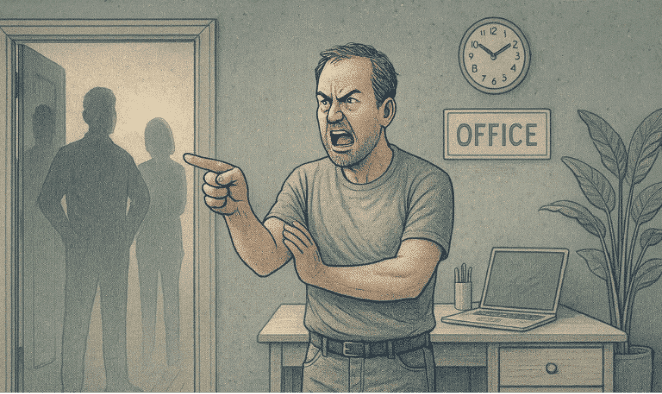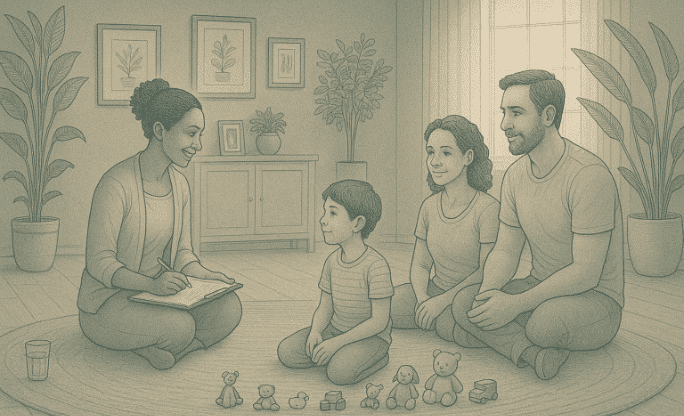Key Takeaways
- Oppositional Defiant Disorder (ODD) is not typically considered a neurodivergent condition because it is classified as a behavioral disorder rather than a neurological difference in how the brain is structured or functions.
- Neurodivergence refers to natural variations in brain function and structure, commonly including conditions like autism, ADHD, dyslexia, and Tourette syndrome that reflect different ways of thinking, learning, and processing information.
- ODD is characterized by persistent patterns of angry, irritable mood and defiant behavior toward authority figures, with environmental factors and emotional regulation difficulties playing significant roles in its development.
- ODD frequently co-occurs with neurodivergent conditions, particularly ADHD and autism, making proper diagnosis and understanding of all present conditions essential for effective treatment.
- A Mission For Michael (AMFM) offers comprehensive mental health treatment programs that address ODD and co-occurring conditions through evidence-based behavioral interventions, family therapy, and supportive care designed for each individual’s needs.
Understanding Neurodivergence
Before we can answer whether Oppositional Defiant Disorder (ODD) qualifies as neurodivergent, we need to know what neurodivergence actually means and which conditions fall under this umbrella. The term has gained widespread use in recent years, but its meaning sometimes gets confused or applied too broadly.
What Does Neurodivergent Mean?
Neurodivergent describes individuals whose brains function differently from what’s considered typical or “neurotypical.” The term emerged from the neurodiversity movement, which views these differences as natural variations in human neurology rather than disorders that need to be fixed or cured.
The concept emphasizes that there’s no single “correct” way for brains to work. Instead, neurodivergent individuals process information, learn, communicate, and experience the world in ways that differ from the majority, but these differences aren’t inherently deficits; they’re simply variations.
Conditions Typically Considered Neurodivergent
The neurodiversity framework commonly includes conditions that reflect fundamental differences in how the brain is wired and functions from birth or early development. These typically include autism spectrum disorder, attention-deficit/hyperactivity disorder (ADHD), dyslexia, dyscalculia, dyspraxia, Tourette syndrome, and some forms of obsessive-compulsive disorder.
What these conditions share is that they represent neurological differences; variations in brain structure, connectivity, or neurotransmitter function that shape how a person thinks, learns, and interacts with the world throughout their life. These aren’t temporary states or learned behaviors, but fundamental aspects of how someone’s brain operates.
The Neurodiversity Movement and Its Origins
The neurodiversity movement began in the late 1990s, largely within the autism community, as a way to shift the conversation from viewing neurological differences as disorders to recognizing them as natural human variation. The movement advocates for acceptance, accommodation, and celebrating the strengths that come with different types of thinking.
This perspective doesn’t deny that neurodivergent individuals may face challenges or need support. Rather, it recognizes that many difficulties arise from a world designed primarily for neurotypical brains, and that accommodating different ways of thinking benefits everyone.
Founded in 2010, A Mission For Michael (AMFM) offers specialized mental health care across California, Minnesota, and Virginia. Our accredited facilities provide residential and outpatient programs, utilizing evidence-based therapies such as CBT, DBT, and EMDR.
Our dedicated team of licensed professionals ensures every client receives the best care possible, supported by accreditation from The Joint Commission. We are committed to safety and personalized treatment plans.
What Is Oppositional Defiant Disorder (ODD)?

ODD symptoms often include angry, argumentative behavior and defiance toward authority figures, creating conflicts in a workplace and social settings.
Defining ODD
Oppositional Defiant Disorder is classified in the DSM-5 as a disruptive behavior disorder. It’s characterized by a persistent pattern of angry or irritable mood, argumentative or defiant behavior, and vindictiveness. These behaviors are typically directed toward authority figures like parents, teachers, and other adults, though they can also affect peer relationships.
ODD appears primarily in childhood and is more about how someone responds emotionally and behaviorally to situations, particularly those involving rules, expectations, or authority. The condition reflects difficulties with emotional regulation and interpersonal dynamics rather than fundamental differences in neurological wiring.
Key Symptoms and Behaviors
The DSM-5 organizes ODD symptoms into three categories. The angry or irritable mood category includes frequently losing temper, being easily annoyed, and feeling angry or resentful. The argumentative or defiant behavior category includes arguing with adults, actively defying rules, deliberately annoying others, and blaming others for mistakes. The vindictiveness category involves spiteful or vengeful behavior.
These behaviors must persist for at least six months and cause significant distress or impairment in social, educational, or other important areas of functioning. The key distinction is that these are reactive behaviors and emotional responses rather than neurological differences in processing or perception.
How ODD Is Diagnosed
Diagnosis requires careful evaluation to distinguish ODD from normal developmental phases of testing boundaries. Mental health professionals assess the frequency, duration, and impact of behaviors, considering the child’s age and developmental stage. They also rule out other conditions that might better explain the symptoms.
Environmental factors, family dynamics, and the presence of other mental health conditions all factor into diagnosis and treatment planning. Unlike neurodivergent conditions, ODD symptoms can often improve significantly or resolve with appropriate behavioral interventions and changes in environment or family dynamics.
Why ODD Is Not Typically Considered Neurodivergent
The Key Differences
Neurodivergent conditions reflect innate differences in brain structure, connectivity, or function that are present from early development. They’re part of how someone’s brain is fundamentally organized. ODD, by contrast, is characterized by behavioral and emotional patterns that develop in response to environmental factors, relationships, and learned ways of managing emotions and conflict.
While neurodivergent conditions are lifelong aspects of how someone’s brain works, ODD can change significantly with intervention. The behaviors associated with ODD aren’t about processing information differently or having a different neurological setup; they’re about difficulty managing emotions and responding to authority in socially appropriate ways.
Behavioral vs. Neurological Conditions
This distinction matters for understanding and treatment. Neurodivergent individuals aren’t choosing to think or process differently; their brains simply work in different ways. Someone with ODD may struggle with behavioral control and emotional regulation, which, while certainly influenced by biology, is more malleable and responsive to environmental changes and behavioral interventions.
Neurodivergent conditions are celebrated by advocates as differences to be accommodated and valued. ODD behaviors, however, cause distress and functional impairment that treatment aims to reduce, not simply accommodate.
Environmental and Emotional Factors in ODD
Research shows that environmental factors play a significant role in ODD development and maintenance. Inconsistent discipline, harsh parenting, family conflict, and other environmental stressors contribute heavily to the condition. The disorder often improves when these factors are addressed through family therapy and parent training.
This environmental responsiveness distinguishes ODD from neurodivergent conditions, which remain present regardless of environmental changes. While support and accommodation help neurodivergent individuals thrive, the underlying neurological differences don’t change—they’re fundamental to who the person is.

ODD is a behavioral disorder characterized by defiance and emotional dysregulation, distinct from neurological conditions.
The Overlap Between ODD and Neurodivergent Conditions
ODD and ADHD: A Common Co-Occurrence
ODD and ADHD frequently occur together. Many children diagnosed with ODD also meet criteria for ADHD, and the two conditions can influence each other. The impulsivity, difficulty with self-regulation, and frustration that come with ADHD can contribute to oppositional behaviors.
When both conditions are present, treating the ADHD often leads to improvement in oppositional behaviors. The child who was defiant partly out of frustration with unmanaged ADHD symptoms may become less oppositional when their attention and impulse control improve.
When ODD Appears Alongside Autism
ODD can also co-occur with autism spectrum disorder, though this requires careful diagnostic consideration. What appears as defiance in an autistic child might actually be difficulty understanding social expectations, sensory overwhelm triggering meltdowns, or communication challenges that look like non-compliance.
Distinguishing between ODD and autism-related behavioral difficulties is crucial because the treatment approaches differ significantly. Strategies effective for ODD may not work well for autistic individuals, and vice versa. A comprehensive evaluation considers all aspects of how the child functions and responds to different situations.
Why Proper Diagnosis Matters
When ODD co-occurs with neurodivergent conditions, both need to be identified and addressed. Focusing solely on the oppositional behaviors without recognizing underlying ADHD, autism, or learning differences misses critical information needed for effective treatment.
Comprehensive assessment looks at the whole picture: behavioral patterns, emotional regulation, cognitive functioning, sensory processing, and environmental factors. This complete understanding guides treatment that addresses all aspects of the child’s needs rather than treating symptoms in isolation.
Why Choose AMFM for Mental Health Treatment

AMFM provides comprehensive treatment for behavioral disorders and co-occurring mental health conditions in supportive, healing environments.
At A Mission For Michael (AMFM), we know that behavioral challenges like ODD often occur alongside other mental health conditions, neurodivergent traits, and family dynamics. Our comprehensive programs take a whole-person approach, using evidence-based care designed for each child’s specific needs.
In our residential settings, young people receive structured, immersive support to build emotional regulation skills, manage conflict in healthy ways, and express their needs constructively. Our clinicians work closely with each individual to uncover the underlying causes of behavior and develop lasting strategies for growth.
Treatment integrates proven behavioral therapies with individual counseling, group skill-building, and family involvement. We focus on the entire family system, helping parents strengthen communication, set consistent boundaries, and support positive change that lasts.
When ODD coexists with ADHD, autism, anxiety, or depression, our integrated model treats every aspect of mental health at once. Our clinicians are skilled at distinguishing overlapping conditions, ensuring interventions respect neurodivergent traits while addressing behaviors that cause distress.
For families needing daily structure but wishing to stay connected at home, our partial hospitalization programs provide intensive daytime therapy with evenings at home; blending the depth of residential care with real-world practice.
Those ready for the next step can transition into outpatient care, where continued therapy, behavioral coaching, and family sessions help maintain progress and reinforce healthy habits.
Because behavioral struggles affect the whole household, our family support programs guide parents, siblings, and caregivers in understanding challenges, improving communication, and creating supportive home environments.
With treatment centers across California, Virginia, Minnesota, and Washington state, we provide evidence-based care in warm, healing spaces. We work with most major insurance providers and simplify the intake process through insurance verification and personalized treatment planning.
Frequently Asked Questions (FAQ)
Can my child be both neurodivergent and have ODD?
Yes, ODD frequently co-occurs with neurodivergent conditions like ADHD and autism. Having both doesn’t make ODD itself neurodivergent, but it does mean treatment needs to address the unique combination of challenges. A child with ADHD and ODD requires approaches that accommodate their ADHD while also addressing the behavioral and emotional regulation difficulties characteristic of ODD.
If ODD isn’t neurodivergent, does that mean it’s just “bad behavior”?
Not at all. ODD is a genuine mental health condition involving difficulties with emotional regulation and behavioral control. It’s not simply willful misbehavior or poor parenting. Children with ODD struggle with skills that come more easily to others, and they need professional support to develop these abilities.
Will treating ADHD or autism help with ODD behaviors?
Often, yes. When oppositional behaviors stem partly from frustration with unmanaged ADHD symptoms, sensory overwhelm related to autism, or difficulty understanding expectations, addressing these underlying conditions typically reduces defiant behavior. However, if ODD exists as a separate condition, it also requires specific behavioral intervention.
How does AMFM help children with ODD and co-occurring conditions?
AMFM provides a comprehensive assessment to identify all present conditions, then delivers integrated treatment addressing behavioral challenges, emotional regulation, and any co-occurring mental health conditions. Through evidence-based behavioral interventions, individual therapy, family work, and when needed, support for neurodivergent traits, we help children develop the skills they need while helping families create environments that support lasting positive change.






